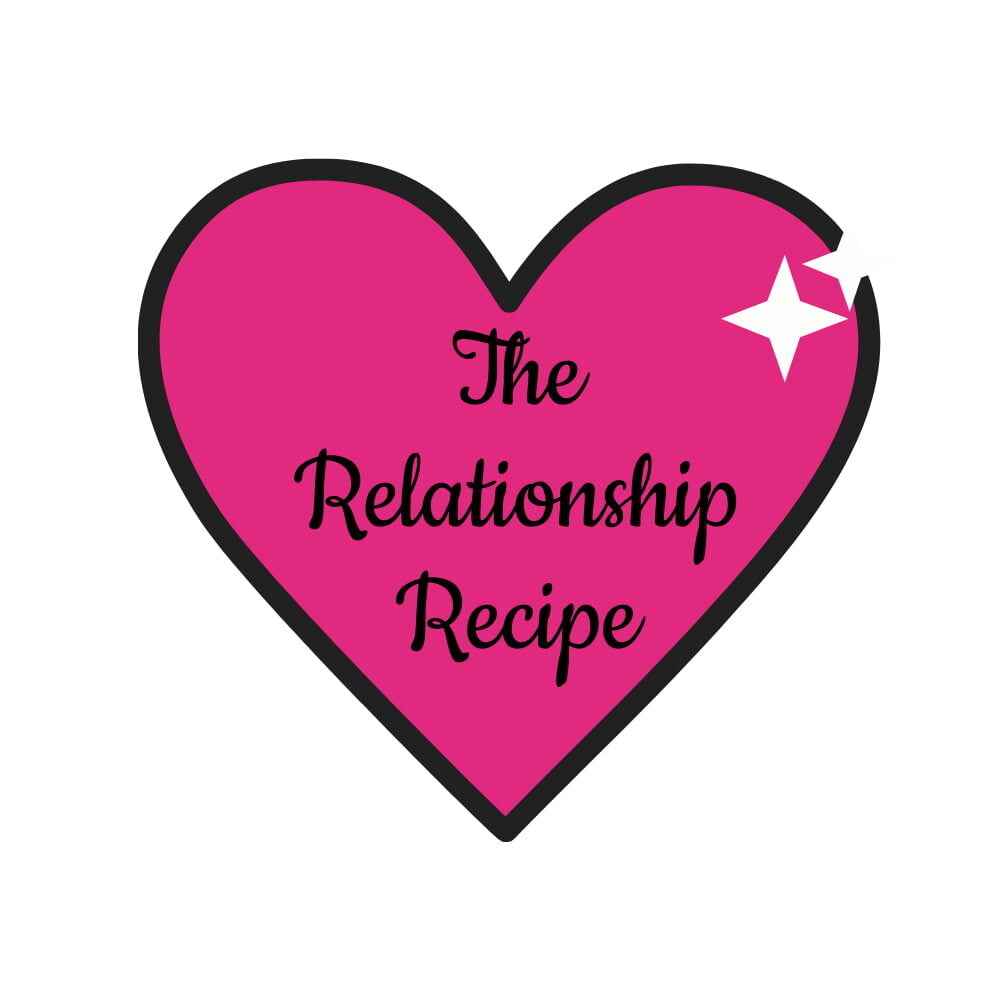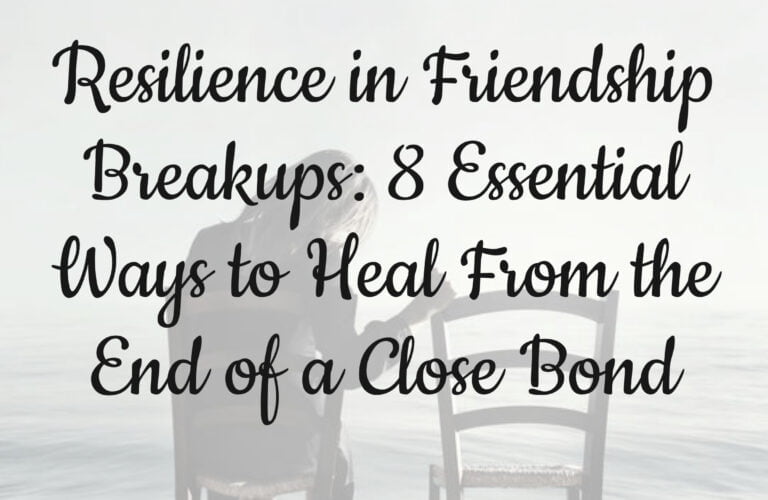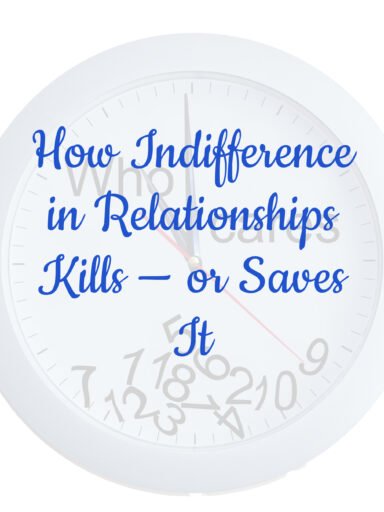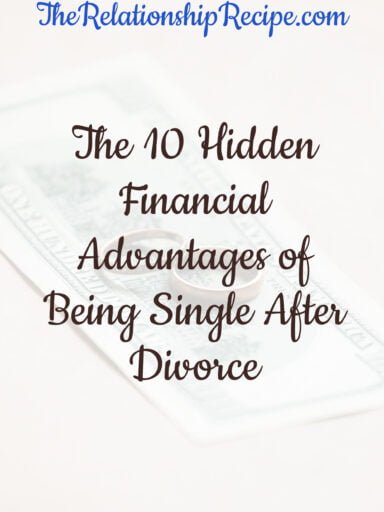Have you ever been ghosted by a friend, or had them knowingly just “fade away”? I have and it hurts. As someone who has experienced the pain of a friendship breakup, I understand the unique and often overlooked challenges that come with the end of a close bond.
The most recent was by someone who I’ll call “Christina”. Christina was a caregiver for one of my customers, so I’d see her once a week. This went on for several years, and we would get together for lunch outside of work too. I loved and respected her. She was quick, intelligent, and capable. I appreciate those qualities in a person.
I was on a two week road trip with the family and she was up in the Northern part of the state helping to get her daughter out of a bad situation with an abusive man. It was a rather clandestine operation and I was concerned for their safety, so I told her to keep in touch about it when she could. Although I was on vacation, I didn’t mind her texts every few hours to give updates on their progress. I was relieved when they made it back safe.

Our mutual customer eventually passed away, and we did see each other and communicate for a while afterward. I was hoping that the test of time would prove our relationship was more than just having our client in common. I felt we had at least that. Heck, we’d even had talks about friendship breakup how hard it is to maintain friendships at our age and in this day and age! That alone gave me hope for keeping her as a friend, since we’d both identified and agreed on the potential pitfalls.
The final time was me reaching out last November with a text asking how she was and to let her know I was thinking about her. It had been a while, and she was on my mind. I never heard back from her. Was she busy? Probably. However, it only takes a minute or less to reply to a text message. Did I say something that offended her? Was I somehow inappropriate? Am I not a good enough listener? Was I…..I…..(fill in the blank)?
After a few days, I realized she wasn’t going to reply. My first thought on this realization was, “Oh no. It’s happening again.” Looking back, I surmise she likely just viewed me as an acquaintance, while I made the mistake of considering her a friend. It doesn’t hurt as much with the passage of time, but I still wonder if she even gives me a passing thought.
This recent incident led me on a quest to figure out the reasons why people do this, and how to best cope with the ensuing emotions that come with it.
Friendship breakups can be emotionally challenging, leaving us feeling heartbroken and confused. In this article, we will talk about the complexities of coping with the end of a close bond, offering guidance and understanding navigating this difficult, confusing terrain.

Recognizing Red Flags That a Friendship Breakup is Coming
Friendship breakups don’t always happen overnight. There are often warning signs that signal the gradual deterioration of the relationship. One of the first signs is decreased communication or avoidance of each other. You may notice that you and your friend are talking less frequently, and when you do, the conversations feel strained or distant.
Frequent arguments or disagreements can also indicate that the friendship is heading towards a breakup. While disagreements are a normal part of any relationship, persistent conflicts left unresolved can erode the trust and connection between friends.
Another red flag is feeling unsupported or unheard in the friendship. Friendships should be a safe space to share feelings and experiences, but if you find that your friend is dismissive of your concerns or not empathetic, it can be a sign that the bond is weakening.
Lastly, growing apart due to different life stages or interests is a common reason for friendship breakups. As we navigate life, our priorities, and passions may change, leading us to drift away from people we were once close to.

Understanding the Emotions After a Friendship Breakup
The end of a close friendship can evoke a range of emotions, and it’s crucial to acknowledge and process these feelings rather than bottling them up. The initial reaction to a friendship breakup is often sadness and grief. Losing someone who was once an important part of your life can leave a void, and it’s okay to mourn that loss.
Anger is another common emotion that arises during friendship breakups. You might feel hurt and betrayed by your friend’s actions or words, leading to feelings of resentment. It’s essential to give yourself permission to feel angry, while finding healthy ways to express and channel this emotion.
Moreover, it’s not uncommon to question your self-worth and self-esteem after a friendship ends. You might wonder if there was something you could have done differently to salvage the relationship. These thoughts of self-doubt can be challenging to navigate, but remember that a friendship breakup doesn’t define your worth as a person.

1. Reach Out for Support
During times of friendship breakup, don’t hesitate to lean on other friends or family members for support. Talking about your feelings with someone you trust can help ease the pain and provide much-needed perspective. Surround yourself with people who care about you and who can offer a listening ear or a shoulder to lean on during this challenging time.
If you find it challenging to talk to people in your immediate circle, consider seeking support from a therapist or counselor. Professional guidance can be immensely valuable in processing complex emotions and navigating the aftermath of a friendship breakup.
2. Reflect on the Relationship
Take some time to reflect on the dynamics of the friendship and the reasons behind the breakup. Understanding what led to the end of the bond can offer valuable insights for future relationships. Ask yourself if there were any recurring patterns or communication issues that contributed to the breakup.
This period of reflection can be an opportunity for personal growth and self-awareness. You might discover areas in which you can improve as a friend, and use this knowledge to foster healthier connections in the future.
3. Avoid Blame and Self-Criticism
It’s natural to want to assign blame when a friendship ends, especially if you feel hurt or let down. However, focusing solely on blame can hinder your healing process. It’s essential to recognize that friendships, like all relationships, are a two-way street, and both parties play a role in their development and outcome.
Avoid engaging in self-criticism and understand that sometimes, friendships change, and that’s okay. Instead of fixating on who is to blame, focus on learning from the experience and using it as an opportunity for personal growth.
4. Forgive and Let Go
Forgiveness is a powerful tool in the healing process. It doesn’t mean condoning hurtful behavior, but rather freeing yourself from carrying grudges and resentment. Holding onto negative emotions can prevent you from moving forward and healing from the friendship breakup.
Practice self-compassion and extend the same understanding and forgiveness to yourself as you would to a friend going through a difficult time. Letting go of negative emotions will aid in your emotional recovery and open up space for healing and growth.
5. Engage in Self-Care
Self-care is crucial during times of emotional distress. Engage in activities that bring you joy and peace, and prioritize your well-being. Whether it’s spending time with other friends, exercising, reading, or pursuing hobbies, self-care helps rebuild your emotional strength and resilience.
Allow yourself the time and space to heal at your own pace. Remember that healing is not linear, and there may be good days and challenging days during this process. Be gentle with yourself as you navigate the emotions and uncertainties that accompany a friendship breakup.
6. Seek Closure (if Possible)
In some cases, seeking closure by having an open and honest conversation with your former friend might be helpful. Approach the conversation with empathy and without the intention of rekindling the friendship. The goal is to gain closure and find peace in understanding the reasons behind the breakup.
Keep in mind that closure may not always be possible, especially if the friendship ended on a particularly sour note. In such situations, finding closure within yourself and through the support of others can be just as valuable in finding healing.
7. Set Boundaries
If you share mutual friends, setting boundaries around your interactions with your ex-friend can be beneficial, especially if seeing them causes additional emotional strain. Prioritize your emotional well-being and communicate your boundaries with respect and clarity.
It’s okay to take a step back from mutual events or social gatherings for a while until you feel emotionally ready to handle those situations. True friends will understand and respect your need for space as you navigate the friendship breakup.
8. Focus on New Connections
As you heal, be open to forming new friendships and connections. While it’s essential to take the time to heal from the friendship breakup, don’t be afraid to step outside your comfort zone and meet new people. Embrace the opportunity to create meaningful and fulfilling relationships.
Join social groups or clubs that align with your interests or hobbies, as these settings can be an excellent way to meet like-minded individuals. New friendships may not replace the bond you lost, but they can enrich your life and bring new joys and experiences.

The Wrap Up
Experiencing a friendship breakup can be an emotionally taxing and challenging process. It’s important to recognize the signs that a friendship is deteriorating, and to acknowledge and process the wide range of emotions that may arise when a close bond ends. Seeking support from friends, family, or a professional can be beneficial during this time.
Remember to avoid blame and self-criticism and focus on understanding the dynamics of the relationship and the lessons you can learn from the experience. Engaging in self-care, practicing forgiveness, and setting boundaries are essential aspects of the healing journey.
Finding closure, whether through an honest conversation or within yourself, can bring a sense of resolution and acceptance. As you heal, be open to forming new connections and embracing the opportunity to create meaningful friendships.
Before You Go…
If you’d like more in depth ways to cope, I’d like to suggest this book, titled Best Friends Forever: Surviving a Breakup with Your Best Friend.
Best Friends Forever, authored by journalist and psychologist Dr. Irene Levine, offers a candid and uplifting exploration of navigating the end of close friendships. Drawing upon the shared experiences of numerous women, Dr. Levine presents insightful anecdotes and innovative strategies to address these complex situations.
Through tools for self-reflection, real-life case studies, and practical guidance on preserving, concluding, or re-evaluating friendships, Levine acknowledges that some separations are unavoidable. Despite the emotional challenges inherent in the dissolution of female friendships, Best Friends Forever reassures women that self-blame and dwelling on past hurts are counterproductive. Instead, the book encourages readers to view the breakdown of a friendship as an opportunity for personal growth, creating resilience and enhancing their capacity for meaningful relationships.
https://www.sondermind.com/resources/articles-and-content/how-to-best-handle-a-friendship-breakup/
This post may contain affiliate links. I earn from qualifying Amazon purchases at no extra cost to you.




